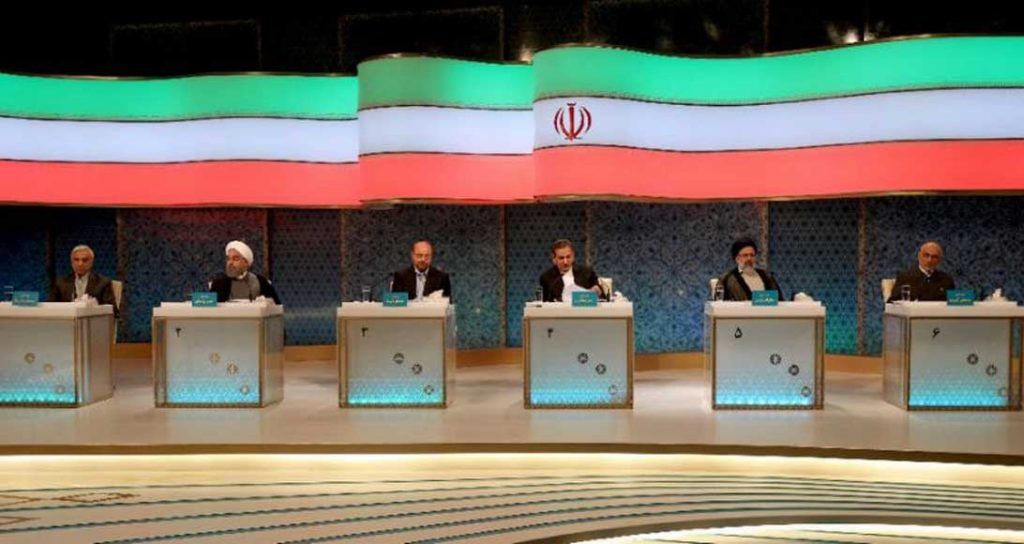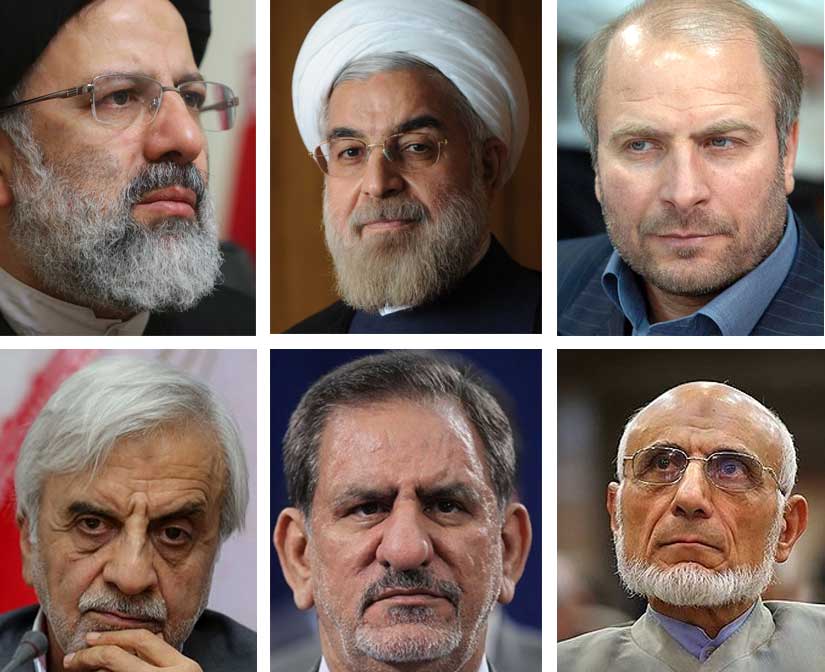May 07, 2017
By Roshanak Asteraki
The second presidential debate was broadcast live on the state-run Iranian TV (IRIB) on Friday evening 5 May 2017. The final six candidates failed once more to discuss the urgent political and economic issues facing the country, and instead engaged in combative and at times vitriolic exchanges.

Mohammad Baqer Qalibaf, the mayor of Tehran, lunged a full-frontal attack on Hassan Rouhani in the first debate on 28 April, accusing the president of failing to fulfil his campaign pledge of creating one million jobs a year.
Rouhani vehemently denied ever making such a promise. Qalibaf, who has been described as a pragmatic conservative, berated Rouhani for accepting the help of Babak Zanjani during the previous presidential election. Zanjani is the former managing director of the UAE-based Sorinet group, an Iranian business conglomerate. He was accused of embezzling $2.7bn of government money and was sentenced to death in 2016.
In contrast, Rouhani’s first vice president, Eshaq Jahangiri, also from the reformist camp, who had shined brightly during the first debate, managed to strengthen his position by successfully challenging Qalibaf’s “dismal” record as the mayor of the capital for the past 12 years.
Meanwhile, lacklustre performances by the centrist candidate, Mostafa Hashemitaba and Mostafa Mirsalim from the conservative camp failed to impress voters.
Ebrahim Raisi, the custodian of Astan Qods Razavi, an autonomous foundation managing the Imam Reza Shrine in Mashhad, disappointed his ultra-conservative supporters by failing to make a strong case for his “jobs and prosperity” slogan during the first debate.

The candidates assumed a calmer and more measured tone in the second debate which arguably prevented them from divulging the regime’s secrets in the heat of arguments on national TV. That, however, didn’t stop Qalibaf and Jahangiri from making innuendos and throwing accusations at each other.
Raisi, on the other hand, tried to stay on topic, outlining his economic plan to tackle unemployment and inflation. Some believe that he is hoping to gain the support of those who voted for the former President Mahmoud Ahmadinejad in the 2009 elections. A number of his campaign workers and advisers are former members of Ahmadinejad’s cabinet.
Qalibaf, Raisi and Mirsalim criticized Rouhani for his handling of the nuclear negotiations which resulted in the Comprehensive Plan of Action (JCPOA) reached in 2015 to curb Iran’s nuclear programme in exchange for sanctions relief.

All the candidates, however, acknowledged the validity of JCPOA, and avoided making any comment that might offend Ayatollah Khamenei who had given his blessing to the negotiations.
Meanwhile, despite their best efforts to challenge Rouhani’s record for the past four years, Mirsalim and Hashemitaba both failed to project themselves as serious contenders in the presidential race.
Jahangiri’s poor performance was a far cry from his confident exchanges in the first debate. He even stuttered at one point while reading from his notes. His arguments were weak and fragmented. Rouhani and Jahangiri seemed to have run out of munition, and were not able to defend the government’s actions.
It is clear that the final six candidates are loosely divided into two groups of conservative and reformist camps. It is very difficult to distinguish between their respective platforms since none of them offers a clear and detailed plan to tackle poverty, unemployment and inflation.
Voters will most likely have to decide between the two strongest contenders who will emerge in the coming days. While Rouhani seems to be a shoo-in from the reformist side, It is not yet clear whether Qalibaf or Raisi will be the ultimate conservative choice.
Their political affiliations notwithstanding, all six candidates share a common thread, namely they are all regime’s insiders and hold senior posts in the government. In other words, while each promises to eradicate corruption if elected, they are all complicit in the actions of the regime.
Oddly enough, each of the candidates has alluded to some of the Islamic Republic’s failures during the debates. Many free-thinkers have been jailed or have left the country for highlighting the same issues.
Qalibaf speaks about the 94 percent majority whose rights have been violated by the small 4 percent minority, but fails to clarifying which groups he himself belongs to. Raisi advocates the rights of the oppressed, but can’t explain why their numbers have been increasing in the past four decades. Mirsalim champions free speech, but as the culture minister he ordered the closures of many reformists newspapers. Rouhani boasts about resolving the nuclear dispute, but neglects to mention that the crisis was created by the regime in the first place. Jahangiri promises to battle corruption which begs the question what he has been doing for the past four years as the first vice president.
It was Ahmadinejad who first used strong language as a weapon to attack his opponents. Rouhani used the same tactic very effectively against his conservative rivals Qalibaf and Saeed Jalili in the last presidential elections. During the 2013 elections, Rouhani also blamed Ahmadinejad for all the country’s problems, and promoted himself as the only candidate who offered real solutions. However, this time round, he cannot blame his predecessor.
Rouhani also lacks the self confidence he demonstrated four years ago. The success of JCPOA has been offset by the serious problems facing the regime including the renewed hostilities between Tehran and Washington, Israel’s friendly ties with Arab countries and uncertain relationships with Russia.
None of the six candidates have offered a comprehensive and viable plan to repair the regime’s failing domestic and foreign policies which have bankrupted the country and turned Iran into a pariah state.

